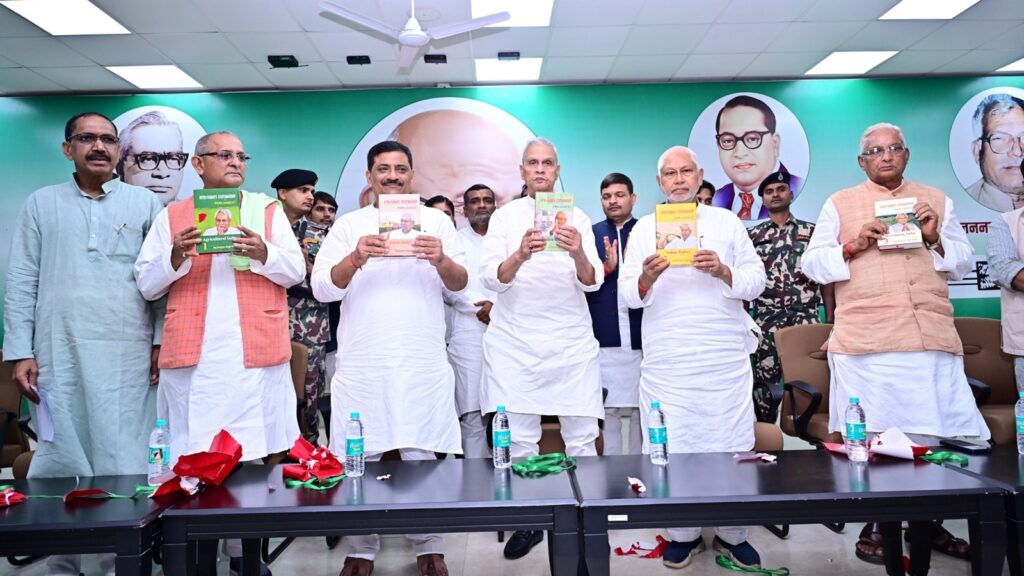PatnaOctober 19, 2025 07:40 AM IST
First published on: Oct 19, 2025 at 07:40 AM IST
From Nitish Kumar’s performance as Railways Minister that convinced former Prime Minister Atal Bihari Vajpayee to project him as the NDA’s chief ministerial candidate to his ideas on women’s empowerment and his views on socialism, secularism and communalism, a book documents the Bihar CM’s speeches in Parliament and the less talked about facets of his time as a parliamentarian.
Published in five volumes, Nitish Kumar’s Statesmanship in Parliament has been edited by political scientist and Bihar OBC Commission’s former member Jag Narayan Singh Yadav and was recently released in Patna. “Though there are many takeaways from Nitish Kumar’s speeches in Parliament, what stands out is his unflinching commitment to secularism and the cohesiveness. This approach was deeply influenced by the socialist ideology,” he said. A six-term MP, Nitish has represented Nalanda and Barh in the Lok Sabha.
He quoted a speech Nitish gave on the security of Amarnath pilgrims Dated on August 5, 1992, in which the JD(U) chief said, “I feel that there should be no obstacle in the historic and traditional Amarnath Yatra. It is a matter of faith for millions of people. If they want to go by the traditional route, they should be allowed. If there are any problems, the government should clarify and ensure security, so that they can feel this country is secular. It is our duty to respect all religions as mentioned in the Constitution. The peaceful situation in the country depends on the harmonious relationship between Hindus and Muslims.”
 The book cover
The book cover
The book also places Nitish’s politics in the context of the Indian version of socialism that took shape with the formation of the Congress Socialist Party in 1934, and leaders such as Jayaprakash Narayan, Acharya Narendra Deva, Minoo Masani, and E M S Namboodiripad. The other big influence was Ram Manohar Lohia, who, unlike the socialist project in Europe, started a campaign to establish social harmony by adding a focus on social inequality apart from economic inequality.
“The large import of Nitish Kumar’s speeches in Parliament highlights how our democracy faces many obstructive elements such as separatism, terrorism, casteism, regionalism, and corruption. Participating in a debate on corruption, Nitish said the House should pass a resolution to express serious concern about corruption prevalent in all spheres of life and requests the government to take the sternest action to eradicate this evil,” said Jag Narayan Singh Yadav.
Yadav links Nitish’s initiatives to overhaul Bihar’s infrastructure and efforts to add a social face to governance to his time as the Railways Minister.
“Nitish Kumar paid attention to the Railways’ social responsibilities, initiating numerous schemes catering to the broader social sector. These included special concessions for disabled travellers, journalists, recipients of the President’s police medal, and enhanced facilities for senior citizens and licensed porters. He reduced the senior citizen age limit from 65 to 60 years, increased the second-class concession from 25% to 30%, and extended facilities for the disabled in second-class and sleeper class to AC 3-tier and chair cars … Gauge conversion plays a crucial role in the expansion of railways. Gauge conversion involves changing narrow-gauge and meter-gauge lines to broad-gauge lines. Considering the population growth and the increasing number of passengers, Nitish Kumar undertook substantial work in this direction. In the general rail budget, he extensively discussed gauge conversion. He set specific targets, aiming for 81 km in 1998-99, 541 km in 1999-2000, and 775 km in 2002-03. Adequate fund allocation was arranged to achieve these targets smoothly,” the book notes.
Yadav also elaborates on how doubling rail tracks was significant for alleviating the “pressure of increasing population and punctuality issues on rail routes”.
Agricultural reforms are also at the core of Nitish’s idea of development, the book says. “Nitish Kumar supports cooperative agriculture and has clear ideas about strengthening and energizing cooperative institutions, recognizing their crucial role in strengthening the rural economy. He has shown interest in ensuring fair crop prices, providing inputs to farmers, and protecting them from intermediaries. Deeply connected with the real situation in rural areas, he views agricultural growth as intertwined with the prosperity of rural people, whose poverty and struggling lives have deeply affected him,” Yadav writes.
The genesis of the Bihar government’s emphasis on the textile industry is also linked to Nitish’s time in Parliament, according to the book. “The success of the textile industry depends on the weavers’ skills and the facilities they receive. Due to modern machines and open market policies, they face difficult problems. Nitish Kumar’s industrial thoughts clearly show that he is well aware of the actual situation of weavers. He has sufficient knowledge of their pain and sensitivity. He raised this concern in Parliament with full empathy, asking about the state-wise number of handloom weavers in the country and whether the government has any concrete plans for their upliftment and welfare. Similarly, he prominently raised the issue of sick spinning mills,” it says.


